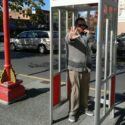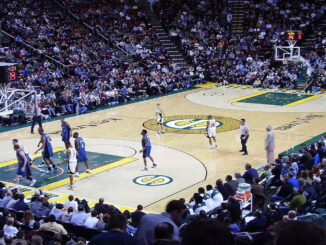
The most recent episodes of ESPN’s documentary “The Last Dance” helped spark—or re-spark for that matter—a debate now more than a decade old: will Seattle ever have an NBA team again?
It’s not that Seattle doesn’t want a team, or even that they don’t deserve one. They are even willing to spend the money to keep one this time around. It’s not Seattle that’s the issue—not anymore, anyway. It’s that the NBA has made it virtually impossible for Seattle to be selected as the home of a team going forward.
But before we get into the how and why the Sonics don’t have a team (and likely won’t anytime soon), let me first show you that attendance, market size, and a history of success was not an issue.
Before we go any further, I should warn you: This story does not have a happy ending. If you were pitching this sad story as a movie concept, it would go something like this:
In less than five years, one of the richest men in the city will somehow buy, sell, and “accidentally” move a beloved basketball team across the country. And it will inexplicably happen during the team’s 40th anniversary.
So just go in knowing you’re going to be massively depressed when this is all over.
Let’s start with success and work our way from there. Seattle entered the league in 1967, had its first winning season in 1972, made its first playoff appearance in 1974, made its first trip to the NBA Finals in 1978 and won the team’s first title in 1979. The Sonics made it back to the NBA Finals again in 1996, and in their 41 seasons, they only had 17 losing records, won one championship, appeared in the NBA Finals three times, made six appearances in the conference finals and had 22 playoff berths. All in all, the franchise put together a very respectable .524 regular-season winning percentage.
Success over 40 years of building a relationship with the city, its fans, and the league was not an issue, so what about market size? Would it surprise you to learn that one of the top media markets in the country does not have a professional basketball team? Seattle is rated the number 13 market in the country (based on Nielsen ratings) and has been without a team since the 2007-08 season concluded.
Tampa Bay is the only other market inside the top 20 without a team, and since the state of Florida already has two NBA teams (Heat and Magic), perhaps the entire NW deserves a second team before we give one state from the SE a third.
Since the ABA-NBA merger in 1976, there have been 16 NBA franchises that have won championships. Only one—the Seattle SuperSonics—is no longer playing in the same market where they won a title.
So, we know long-term success and market size is not an issue. It must be attendance right? Let’s take a look.
During the mid-to-late-1990s, when the team was arguably at its peak in popularity, fans routinely sold out Key Arena, filling the stands to capacity to see their Sonics up close. When Starbucks CEO Howard Schultz bought the team in 2001, fan support was slightly down, leaving about 10% of seats empty, but those numbers trended up slightly in the first couple of years. It hit a peak in 2004-05 when the team won a playoff series for the first time since 1998.
Yes, fan support took a nose dive in 2007-08, and while one could easily blame that on the recession, the root for poor attendance mostly goes to the team announcing it was relocating one week into the campaign.
So, why didn’t fan support dwindle when Schultz announced the sale of the team in July of 2006 to Oklahoma City businessman Clay Bennett? The short answer is that the sale came with a very small reassurance—that Bennett and his investors would make a good faith effort to keep the team in Seattle by gaining funding for a new arena. The reason that was a very small reassurance is that Bennett only agreed to a period of one year, despite Schultz struggling to obtain funds for three years prior, which led to the sale of the team in the first place. So the state wasn’t willing to listen for three years to a guy with long ties to the city of Seattle and running two of its largest businesses, a guy who wanted to keep the team in the city it belonged in, but they were going to listen to some dude from OKC who had not done a very good job of hiding that he wanted to be the guy to bring basketball to OKC? Sure, let’s go with that.
And yet fans still filled the stadium at an average of 94% of capacity, as they assumed Bennett would make good on his promise to try and keep the team in Seattle and wanted to do their part by not letting attendance slip and give him a reason to let them down. Yet one year later, despite solid fan support but no movement on getting funding for a new arena, the NBA agreed to allow the Sonics to relocate to OKC, and as you can imagine, attendance plummeted to their lowest average in years—78% of stadium capacity.
Their team was leaving and there was nothing they could do about it.
So attendance was not an issue—at least not until the team was obviously being relocated and the national economy plummeted. We can assume that attendance, market size, and success were not factors in the sale. What it ultimately boiled down to was revenue from attendance and television ratings that didn’t exist.
Schultz, who knew how to run a large business without question, was perhaps out of his element when running a sports franchise, and he noticeably struggled with the concept of an organization whose main employees and customers value loyalty over just about anything else—especially compared to those looking to serve and consume coffee and the occasional light pastry. Even if the fans offered their full support of Schultz’s ownership style (they didn’t), he had trouble with the city and state government not wanting to help fund a new stadium at a time when they had just completed new homes for the Mariners and Seahawks, and were just a few years removed from renovating Key Arena.
Schultz didn’t have access to the TV deals teams are getting revenue from today, and so his market size didn’t help him. He was filling seats at the arena, but profits from tickets were no longer keeping him ahead of player salaries in a league that kept increasing the salary cap to a point it exceeded what the Sonics could comfortably pay out and actually profit year to year. His team wasn’t winning at the moment, yet fan attendance remained high, so winning wasn’t an issue. Schultz knew the only way to survive was to put more fans in the arena, and the only way to do that was to ask for help from the state to make the arena larger, or build a new one. He was repeatedly denied, and this was even with the support of then-commissioner David Stern.
So with no shiny new stadium on the horizon and a business losing cash, Schultz looked to sell the team. Whether any folks from the Seattle area made a realistic offer is not clear, but Schultz maintains that he could not find a local buyer, so he went looking outside the team’s home turf. He eventually accepted Bennett’s offer, and despite the bid coming from a group well established in Oklahoma and with exactly zero ties to the NW, the league approved the sale. It wouldn’t be the first time an owner came along from parts unknown, but it would be the worst.
And with that, so long Sonics. Hello…..nothing at all.
Oklahoma City has a team now, but Seattle retains the SuperSonics name, logos, colors, etc. If the NBA were to award the city of Seattle a team, they could just snap their fingers and make that team the Sonics. But a lot of things have to happen before the city of Seattle will be awarded an expansion franchise.
Oh you want to discuss relocation first? Ok, here goes.
Every single team in the league had revenue growth of at least 6% in 2020 over their 2019 revenue. There’s a chance a team could struggle enough it would need to sell and be willing to sell to a buyer wanting to relocate, given today’s unsure financial situation. Even if a team were willing to sell right now and relocate, Clay Bennett, the man most Seattle fans blame for taking their team away, is the chairman of the NBA’s relocation committee. He took a team from Seattle in 2008, stopped the Kings from being sold and relocated to Seattle in 2013, and I suppose he could be interested in helping Seattle the third time around, but I wouldn’t hold my breath.
So back to expansion.
NBA commissioner Adam Silver has stated that expansion is not high on his agenda right now. He has 30 teams, a thriving league, and a talent pool that is deep at the top, and shallow at the bottom. So why weaken a thriving product by adding at least two new teams (single team expansion isn’t impossible but extremely unlikely) just to make a city happy that essentially told the NBA that basketball was too expensive for them?
You may be asking yourself when and how the city of Seattle said this. Well, it was by passing measure 91 in 2006 that essentially eliminated the possibility of public funding for professional sports teams—and this was when their team was asking for help and needed it most.
Seattle has proven over the last decade that they are more than willing to spend if it means getting their Sonics back, but even when the new arena at the Seattle Center is finished next year, and depending on the official seating capacity, it may come up short of what a prospective ownership group and the NBA expansion committee members are looking for.
There are fans begging for basketball back in Seattle. The market is as strong as ever. There are TV deals to help even the teams in need of profits, and we know the Sonics can win on the court over time. There is even a shiny new arena to make everyone happy.
So will an NBA team be back in Seattle? There isn’t any reason to believe it will happen given recent history, but we’ll have to hope that one day, the NBA will make things right and reunite the SuperSonics and their fans.
The fans certainly deserve it. Will an owner come forward who can convince the NBA that a team is needed in Seattle? I certainly hope so. The NW and more importantly the NBA doesn’t feel whole without the SuperSonics, and won’t until they make their triumphant return.




